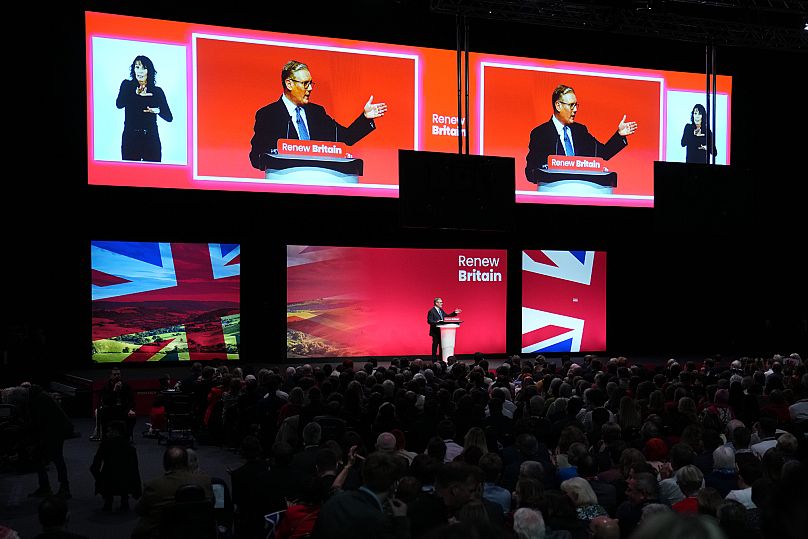Labour promised economic growth, but has struggled to deliver and inflation remains stubbornly high with a subdued economic outlook.
UK Prime Minister Keir Starmer accused hard-right politician Nigel Farage of crossing "a moral line" with his anti-immigration views, as the British leader contrasted his vision of "patriotic renewal" with what he called Farage's divisive politics of grievance.
 ADVERTISEMENT
ADVERTISEMENT
 ADVERTISEMENT
ADVERTISEMENT
Battling dire approval ratings, a sluggish economy and questions about his leadership, Starmer came out swinging with a punchy speech on Tuesday saying that Britain faces a "fight for the soul of our country" between the governing centre-left Labour Party and Farage's right-wing Reform UK.
He urged voters to reject "snake oil merchants on the right, on the left" who promise "a quick fix, a miracle cure," and told Labour's annual conference in Liverpool that while the country faces problems, "I just do not accept that Britain is broken."
"When was the last time you heard Nigel Farage say anything positive about Britain's future?" Starmer said, "He can't. He doesn't like Britain, doesn't believe in Britain, wants you to doubt it as much as he does."
Government under pressure
Since Labour won a landslide election victory in July 2024, its popularity has plummeted.
The party promised economic growth, but has struggled to deliver. Inflation remains stubbornly high and the economic outlook subdued, frustrating efforts to repair tattered public services and ease the cost of living.
Chancellor of the Exchequer Rachel Reeves said on Monday that wars in Ukraine and the Middle East and US President Donald Trump’s trade tariffs have caused "harsh global headwinds," and hard economic choices loom when she sets out her budget in November.
Starmer cautioned on Tuesday that tough economic choices "will keep on coming."
Against that gloomy backdrop, Labour's annual conference, held under the motto "Renew Britain," has been dominated by conversations about how to fight Reform.
Farage's party has topped opinion polls for months, ahead of both Labour and the main opposition Conservatives, despite holding just five of the 650 seats in the House of Commons.
Echoes of MAGA
Farage's anti-establishment, anti-immigration message, with its echoes of Trump's MAGA movement, has homed in on the issue of thousands of migrants in small boats arriving in Britain across the English Channel.
More than 30,000 people have made the dangerous crossing from France so far this year despite efforts by authorities in Britain, France and other countries to crack down on people-smuggling gangs.
Farage has vowed to deport everyone arriving by small boat and go even farther, stripping the right to remain in the UK from many legal residents.
Starmer said on the weekend that such a policy would be "racist" and "immoral." He also has expressed alarm that a march organised by anti-immigration campaigner and convicted fraudster Tommy Robinson attracted more than 100,000 people in London earlier this month.
In a sweeping hour-long speech, Starmer set out his vision for a government he said would marshal public and private investment to rebuild crumbling infrastructure, restore public services, improve education, build new homes and revive British industries from steelworks to data centres.
Stepping into culture wars territory that can be uncomfortable for Labour, he said people should be proud to fly national flags "as we celebrate difference and oppose racism."
He said it was a "reasonable demand" for people to want secure borders and to end unauthorised immigration, something his government has struggled to do so far.
"But there is a line, a moral line, and it isn't just Farage who crosses it," he said. "Controlling migration is a reasonable goal, but if you throw bricks and smash up private property that is not legitimate, that is thuggery."
Farage said he was "shocked" by Starmer's speech and said he was "unfit" to be prime minister.
He also accused Starmer of calling Reform supporters racist "by implication" and called the speech "an absolute disgrace."














